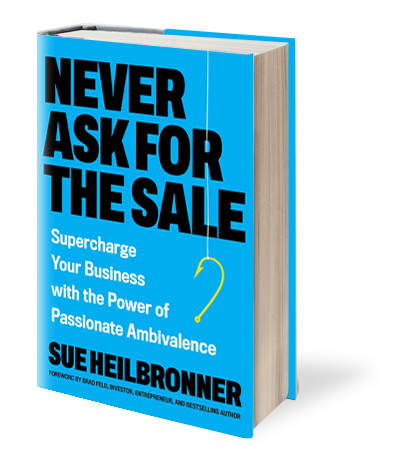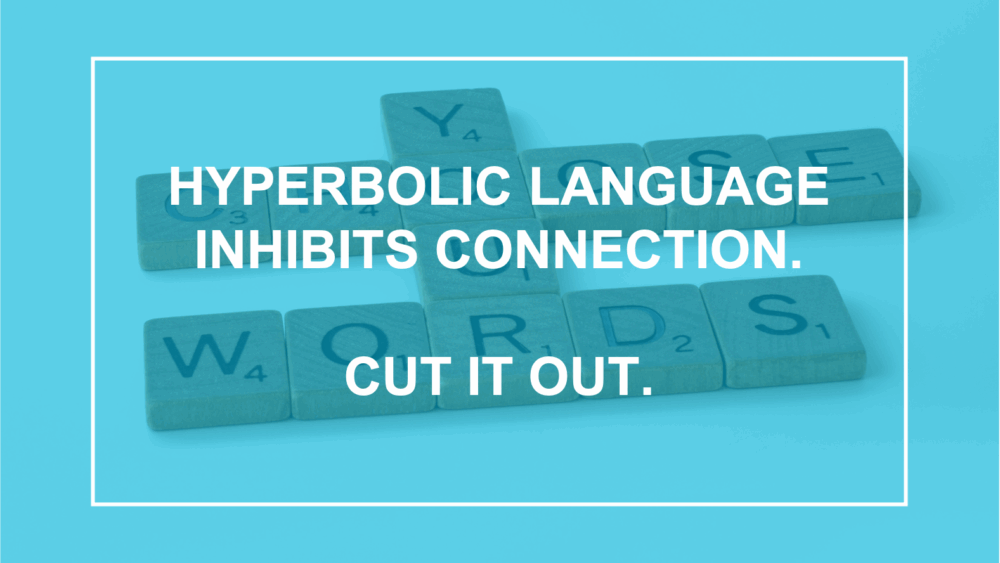Hyperbolic Language Inhibits Connection. Cut It Out.
If you really, really knew me, you would know that this is a most unlikely post for me to write.
I am the most hyperbolic person most people know.
See what I did there?
I use expressive language. I use extreme language. I do this at times to flex my vocabulary, at times to get attention, at times to force a point. But in truth, I generally do it without even noticing I’m doing it.
So on one hand, I should not be making the point I’m about to make. On the other hand, I am the most perfect person to make this point (you’re starting to get the picture).
In the work of Conscious Leadership, my teachers and I say “you spot it, you got it.” If something is triggering over there, you ought to take a good look at yourself to see how that very quality is in you. I’ve done that homework. I gave it to you right up front. Check.
And, I want to share that my attunement to this quality helped me see how painful and perilous it can be for leaders and teams.
Before you read any further, you might want to pick up Annie Duke’s fantastic book, Thinking in Bets. Written by an internationally famous poker player, the book offers how to approach decision-making in the face of imperfect information. One thing I took from this book (no wonder it resonated) is that we are both smarter and more persuasive when we acknowledge the absence of perfect information supporting an assertion. We are more trustworthy (and accurate) when we try to pin a percentage likelihood that we’re right about a thing in lieu of simply verbally strutting about as if there’s no chance we’re wrong. I’ve written about facts and stories. Facts are few and very dull. Stories aren’t bad. They’re just not “true” necessarily.
Okay. There’s the landscape.
I occasionally attend the leadership team meetings of a client company. They are early still, but they’ve had strong success in bringing along early customers and investors…quickly.
One thing I have observed in this team is a tendency to make things either “fantastic” or “terrible,” “useless,” “pointless,” “dead on arrival.” I can feel the wind going out of my sails when I hear this kind of language with regularity. I can hear how use of language like this — which feels adamant, dismissive, and righteous to me — can become part of the culture of a team or a company if no one is paying attention to it. I can feel in me a desire to fight, to prove the one exceptional circumstance that disproves the proclamation. Yuck. Ick. I hate it. And I do it. In me, it’s not always negative. My family lambastes me for declaring a dish I’m eating “the best X I’ve ever had.”

Today, I sat with a new individual coaching client. This person has been getting feedback about being polarizing, about being entrenched in the quick decisions he makes. As I sat with him and listened, it struck me that a material part of this dynamic might be simply the language he is using. He has a broad and dynamic vocabulary. He uses words like “asinine.” He somewhat offhandedly might say that something is 500% better than something else. Look, there’s nothing inherently wrong with something being 500% better than another thing, as long as you are stating a fact and it’s measurable and it’s accurate. If not, language that is absolute can be polarizing. Language that is absolute can (I’m 70% sure) undermine trust. Language like this is the smarty pants alternative to pounding the table or putting your fingers in your ears until someone is done speaking.
In addition, I am of the opinion that the less privileged people in the room (by title, by age, or by some other differentiator) may not have the liberty to make this move. So on top of everything else, curbing this kind of language might positively affect your inclusion efforts.
Hyperbole is not worth it, except perhaps in marriage vows. There are other ways to make a point that don’t place confidence, conversation, and openness on the line.
Try listening to your language, on Slack, in meetings, and emails. Are there openings in your comments that afford meaningful space for reasonable disagreement or feedback? If not, dial it back. Instead of going to 11 with your word choice, try a 6. “Asinine” might be “suboptimal.” “Extraordinary” might be “impressive.”
Let me know how it goes. I am sure (hopeful) that this will be transformative (useful) for you (someone).
*****


